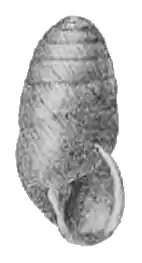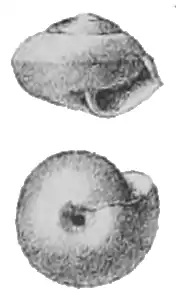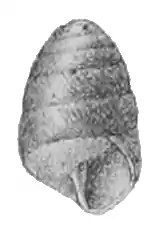Edentulina moreleti
Edentulina moreleti is a species of air-breathing land snail, a terrestrial pulmonate gastropod mollusk in the family Streptaxidae.
| Edentulina moreleti | |
|---|---|
 | |
| An apertural view of a shell of the species | |
| Scientific classification | |
| Kingdom: | |
| Phylum: | |
| Class: | |
| (unranked): | clade Heterobranchia
clade Euthyneura |
| Superfamily: | |
| Family: | |
| Subfamily: | Orthogibbinae |
| Genus: | |
| Species: | E. moreleti |
| Binomial name | |
| Edentulina moreleti | |
| Synonyms[2] | |
Distribution
Edentulina moreleti is endemic to the Seychelles.[2]
The type locality for this species is Silhouette Island.[2] It also occurs on Mahé.[2] Up to 1999 there were only 34 known specimens in collections.[2]
Description
The species gives live birth rather than laying eggs. The newborn snails are yellow in color.[10] Juvenile snails are also yellow with crimson tentacles.[10] Adult snails are dark brown,[10] but Martens (1898) described the body as red.[6]
The reproductive anatomy and radula have been described by J. Gerlach & A. C. van Bruggen (1999).[2] The formula of the radula is 29 + 1 + 29.[2] Salivary glands are bilobed.[2]
The color of the shell is a tan brown.[10] The width of the shell is 5.3-6.5 mm.[2] The height of the shell is 11.0-14.0 mm.[2] The shape of the shell is bulimoid.[2] The shell has 6.75-7.75 whorls.[2] There is no spiral sculpture on the shell.[2]
 juvenile shell |
 subadult shell |
 adult shell |
The only other species of Edentulina on the Seychelles is Edentulina dussumieri, which is the most abundant streptaxid snail there.[2][10] Edentulina moreleti is smaller than Edentulina dussumieri which is over 14 mm in shell height, and Edentulina dussumieri has spiral sculpture on the shell.[2]
Ecology
Edentulina moreleti inhabits habitats with high humidity and with many Dracaena reflexa plants.[10] The population density of this species is low: about 160 individuals at locality area of 2 ha.[10] Edentulina moreleti is ovo-viviparous.[10]
Edentulina moreleti is the only known herbivorous streptaxid.[10] Other Streptaxidae are carnivorous.[10] Edentulina moreleti probably feeds on algae and decomposing plants, that occur on leaves of Dracaena reflexa.[10] They can be fed with carrot, apple and decomposing leaves in captivity.[10]
References
- Adams H. (1868). "Descriptions of new species of shells collected by Geoffrey Nevill Esq., at Mauritius, the Isle of Bourbon, and the Seychelles". Proc. Zool. Soc. Lond. 1868: 288-292. page 291.
- Gerlach J. & Bruggen A. C. van (1999). "Streptaxidae Mollusca: Gastropoda: Pulmonata) of the Seychelles Islands, western Indian Ocean". Zoologische Verhandelingen 328: 1-60. page 47. abstract, PDF.
- Pfeiffer L. G. C. (1841). Symbolae ad historiam Heliceorum 1: 1-88. Th. Fischer, Cassel. page 350, pl. 28 fig. 10.
- Nevill G. (1868). "Notes on some of the species of land Mollusca inhabiting Mauritius and the Seychelles". Proc. Zool. Soc. Lond. 1868: 257-261.
- Martens E. von (1880). "Mollusken". In: Möbius K. (ed.) Beiträge zur Meeresfauna der Insel Mauritius und der Seychellen: 181-352. Gutmann, Berlin. page 205.
- Martens E. von & Wiegmann F. (1898). "Land- und Süsswasser-Mollusken der Seychellen nach den Sammlungen von Dr. Aug. Brauer". Mitteilungen aus der Zoologischen Sammlung des Museums für Naturkunde in Berlin 1: 1-94. page 8-13, plate 1, figure 11-14.
- Barnacle G. A. S. (1962). "The land and freshwater shells of the Seychelles group of islands (including the Amirantes, Coetivy, Farquhar, Cosmoledo and Aldabra)". J. Sey. Soc. 2: 53-57. page 54.
- Lionnet J. F. G. (1984). "Terrestrial testaceous molluscs". In: Stoddart D. R. (ed.) The biogeography and ecology of the Seychelles Islands: 239-244. W. Junk, The Hague. page 240
- Gerlach J. (1987). The land snails of Seychelles. A field guide. 1-44. Privately published, Weedon. page 9.
- Gerlach J. (2001). "Edentulina moreleti, the first herbivorous streptaxid (Gastropoda)". Phelsuma 9: 75. PDF.
External links
- Moellendorff O. von & Kobelt W. (1902-1904). "Die Raublungenschnecken (Agnatha). Erste Abtheilung: Rhytididae & Enneidae". Systematisches Conchylien-Cabinet 1, 12(B1): 1-362. Bauer & Raspe, Nuremberg. page 298, plate 33, figs 9-10.